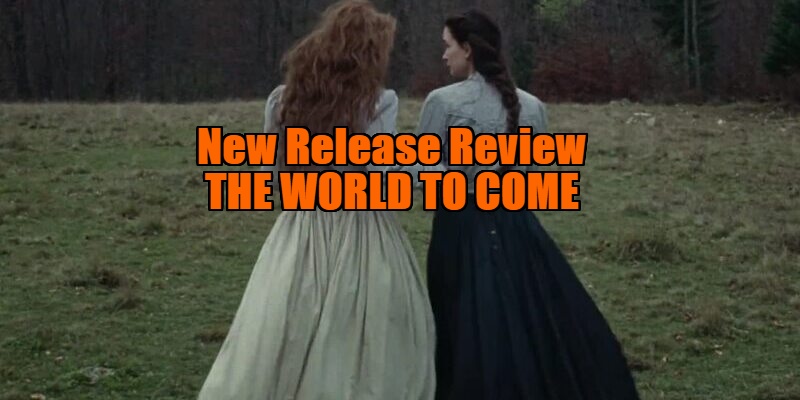
Review by
Eric Hillis
Directed by: Mona Fastvold
Starring: Vanessa Kirby, Katherine Waterston, Christopher Abbott, Casey
Affleck

Is The World to Come yet another lesbian drama set against
the backdrop of a period setting? Corset is. This one comes courtesy of
director Mona Fastvold, who made her debut in 2014 with
The Sleepwalker but is probably better known for co-writing
Brady Corbet's
The Childhood of a Leader
and
Vox Lux.
Set in 1856 Upstate New York (making this a very Eastern Western), the film
introduces us to the relatively affluent but grim existence of Abigail (Katherine Waterston), who lives on a freezing cold farm with her mechanically minded husband
Dyer (Casey Affleck, whose character owns a device that can peel an
apple in two seconds, while in 2021 I can't get a toaster that will take a
full slice of bread). Since losing their four-year-old daughter to
diphtheria the previous year, the couple have lived under a cloud of
unspoken grief and tension. Abigail uses the loss of her child as an excuse
to shun her husband's physical advances, but we come to learn the truth of
her disinterest.

When a young couple - Tallie (Vanessa Kirby) and Finney (Christopher Abbott) - rent the neighbouring farm, Abigail befriends Tallie. The two bond over
shared intellectual interests that have been suppressed by their practical
partners (Dyer dissuades Abigail from purchasing an Atlas), and are soon
spending their days in each other's company, neglecting their duties at
home, much to the chagrin of their hubbies. As you might expect, it's not
long before bodices are being ripped.
Fastvold's film adds little to the increasingly crowded field of period
dramas involving lesbian longing, and it never quite justifies its
historical setting. Both couples are transplanted intellectuals, and both
husbands seem relatively accepting of their wives' homosexuality. When Dyer
and Finney inevitably learn of the true nature of Abigail and Tallie's
relationship, they seem barely shocked by the infidelity, and even less so
by the lesbianism. The usual justification for setting queer dramas in the
past is to mine drama from society's lack of acceptance, but that never
really comes into play here.

The World to Come might just as easily have been set in some
modern day hipster enclave (Abbott's blowhard Finney would no doubt have his
own podcast while Dyer would be in charge of a struggling bubble tea
outlet). Kirby's Tallie comes off as strikingly anachronistic, the sort of
confident American woman that wouldn't really come to prominence until the
Roaring Twenties a half century later. It's as though Paula Prentiss's
character from The Stepford Wives was transplanted into a
western.
If anything excuses the period setting it's the scenery. Like so many
recent westerns, The World to Come was shot in Eastern Europe,
Romania in this case. Cinematographer Andre Chemetoff's
compositions may have you reaching for the pause button to take in the
landscape shots, which range from snow-blanketed to sun-scorched. The film
may be set in a harsh physical terrain, but it sure looks pretty.

For all its visual splendour, Fastvold's film is scuppered by its script.
Abigail keeps a journal of her thoughts, which serves as a patronising
voiceover that seems to believe the viewer can't decipher the images on
screen for themselves. Waterston's performance is quite brilliant, so we
don't need a voiceover to tell us how she's feeling in every little moment,
as we can see it on the actress's face and in her movements. Rather than
allowing us to bask in the unspoken heat between Abigail and Tallie, that
bloody narration insists on hammering home the point. Yes, we get it,
they're dying to tear each other's clothes off! We really don't need a
voiceover to tell us that. Yes, we can see the land is covered in snow and
blasted by wind; we don't require the narration to inform us that it's quite
cold. It doesn't help that much of Abigail's narration features such cringey
lines as "I feel like a library without books."
I can't think of a voiceover that has ruined a film quite as much as this,
and were it removed I would possibly bump up my rating by a whole star.
The World to Come tells a familiar tale but it does so with a
quartet of impressive actors against a visually stunning backdrop. Why
anyone would think to drown out all the good work with such inane narration
is baffling.


